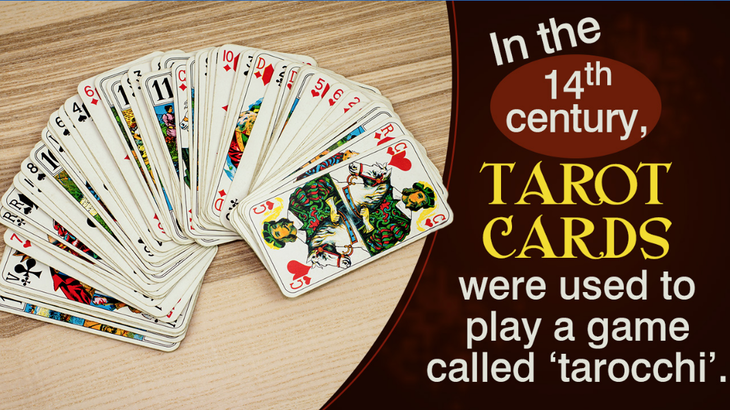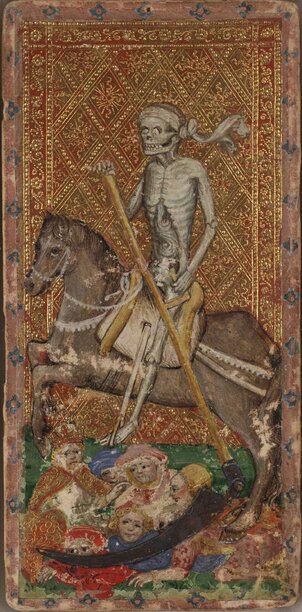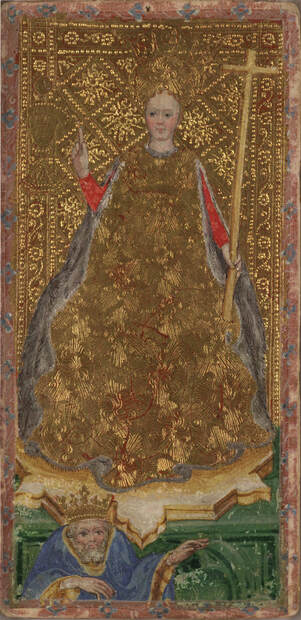What is tarot?
Picture this: a deck of 78 enchanting cards, divided into two captivating sections. First, we have the "major arcana" with 22 cards that boast names like the Lovers, Judgment, and the Devil. Intriguing, right? But wait, there's more! The remaining 56 cards are split into four marvelous suits: Wands, Swords, Cups (or Chalices), and Pentacles (or Coins), each suit flaunting 14 unique cards.
But here's a mind-boggling revelation: tarot cards weren't originally concocted to foresee the future. Nope, not at all! Back in the early 14th and 15th centuries, these mystical cards were born as a deck for an enthralling game called tarocchini/tarocchi. It was all about collecting points for assembling sets and runs of cards—think Rummy with a dash of Bridge-like flair.
But here's a mind-boggling revelation: tarot cards weren't originally concocted to foresee the future. Nope, not at all! Back in the early 14th and 15th centuries, these mystical cards were born as a deck for an enthralling game called tarocchini/tarocchi. It was all about collecting points for assembling sets and runs of cards—think Rummy with a dash of Bridge-like flair.
Now, here's where it gets interesting. In those days, these tarot decks were meticulously hand-painted, making them quite the luxury item. You know who had the privilege of playing cards all day? The well-to-do folks, of course! Ah, the joys of being wealthy—more time for leisurely card games, am I right?
Fast forward to today, and we find ourselves marveling at the Visconti-Sforza cards—the oldest surviving tarot cards from 15th century Italy. These magnificent creations were commissioned by none other than Filippo Maria Visconti, Duke of Milan, and continued by his talented successor and son-in-law, Francesco Sforza. No wonder they carry such an illustrious name!
Sadly, only about 15 of these extraordinary decks remain, scattered across museums, libraries, and exclusive collections worldwide. These relics offer a glimpse into the Renaissance era, where art flourished, and tarot cards were no exception. With vibrant colors and even touches of radiant gold, they were true works of art back then—and personally, I believe they still are today!
Fast forward to today, and we find ourselves marveling at the Visconti-Sforza cards—the oldest surviving tarot cards from 15th century Italy. These magnificent creations were commissioned by none other than Filippo Maria Visconti, Duke of Milan, and continued by his talented successor and son-in-law, Francesco Sforza. No wonder they carry such an illustrious name!
Sadly, only about 15 of these extraordinary decks remain, scattered across museums, libraries, and exclusive collections worldwide. These relics offer a glimpse into the Renaissance era, where art flourished, and tarot cards were no exception. With vibrant colors and even touches of radiant gold, they were true works of art back then—and personally, I believe they still are today!
The late 18th century marked an important period for the development of tarot cards as tools for divination. Jean-Baptiste Alliette was a prominent French occultist who played a significant role in popularizing tarot card reading for divinatory purposes.
Alliette published several works explaining the connections between tarot cards, astrology, the four elements, and the four humors. In 1788 or 1789, he released a modified tarot deck that was specifically designed for divination. This deck, known as the Etteilla Tarot, became the foundation for many tarot decks used today. Alliette's deck was based on the piquet deck, which was a shortened pack of cards commonly used for gaming. The piquet deck utilized the French suit system with Clubs, Spades, Hearts, and Diamonds. Alliette incorporated one nontraditional card called "Etteilla" into the piquet deck, giving his deck a unique touch.
Piquet itself was a popular card game played at courts and among various social classes throughout the 18th century. It was enjoyed by royals such as Anne Boleyn and Elizabeth I, and it held the status of the "national game of France" until it declined in popularity after World War II. Alliette's contributions to tarot divination and the modification of the piquet deck played a significant role in shaping the tarot decks used today and their association with symbolism and esoteric meanings.
Alliette published several works explaining the connections between tarot cards, astrology, the four elements, and the four humors. In 1788 or 1789, he released a modified tarot deck that was specifically designed for divination. This deck, known as the Etteilla Tarot, became the foundation for many tarot decks used today. Alliette's deck was based on the piquet deck, which was a shortened pack of cards commonly used for gaming. The piquet deck utilized the French suit system with Clubs, Spades, Hearts, and Diamonds. Alliette incorporated one nontraditional card called "Etteilla" into the piquet deck, giving his deck a unique touch.
Piquet itself was a popular card game played at courts and among various social classes throughout the 18th century. It was enjoyed by royals such as Anne Boleyn and Elizabeth I, and it held the status of the "national game of France" until it declined in popularity after World War II. Alliette's contributions to tarot divination and the modification of the piquet deck played a significant role in shaping the tarot decks used today and their association with symbolism and esoteric meanings.
Does tarot tell the future?
Well, it's a bit like asking if your horoscope can predict if you'll stumble upon a hidden treasure chest tomorrow. The answer is both yes and no, my curious friend!
Here's the deal: a Tarot spread, when it's large enough, can give you a remarkable sense of the probabilities lurking in a situation. It's like having a crystal ball that shows you the potential outcomes. But hold your horses, because the specific way things pan out is ultimately up to you. You're the star of your own show, and how well you adapt to the ever-changing conditions revealed in your reading determines the grand finale.
Think of a Tarot reading as a snapshot of what's happening in the present, right at the moment those cards are chosen. It's like catching a glimpse of the cosmic dance floor where the universe is busting its moves. This peek behind the curtain can help you spot aspects of a situation that your ego might have missed, opening your eyes to a whole new level of awareness.
Now, here's where it gets intriguing. Some folks out there possess a magical blend of Tarot knowledge and psychic abilities. They might just give you goosebumps with their uncanny predictions of the future. But as for me, I take a different approach. Instead of trying to foresee every twist and turn, I prefer to empower my clients by helping them extract wisdom from the cards and craft a kick-ass plan. Together, we create a roadmap that leads to the life they truly desire.
Here's the deal: a Tarot spread, when it's large enough, can give you a remarkable sense of the probabilities lurking in a situation. It's like having a crystal ball that shows you the potential outcomes. But hold your horses, because the specific way things pan out is ultimately up to you. You're the star of your own show, and how well you adapt to the ever-changing conditions revealed in your reading determines the grand finale.
Think of a Tarot reading as a snapshot of what's happening in the present, right at the moment those cards are chosen. It's like catching a glimpse of the cosmic dance floor where the universe is busting its moves. This peek behind the curtain can help you spot aspects of a situation that your ego might have missed, opening your eyes to a whole new level of awareness.
Now, here's where it gets intriguing. Some folks out there possess a magical blend of Tarot knowledge and psychic abilities. They might just give you goosebumps with their uncanny predictions of the future. But as for me, I take a different approach. Instead of trying to foresee every twist and turn, I prefer to empower my clients by helping them extract wisdom from the cards and craft a kick-ass plan. Together, we create a roadmap that leads to the life they truly desire.
How does it work?
I must confess that I don't have all the answers. But what I do know is that it does work, and it can work wonders when we approach it with the right mindset.
Tarot is like a trusty companion on our journey of self-examination, growth, and healing. It's like that friend who's always there to lend an ear and offer some sage advice (except it's a deck of cards instead). Some say that energy, the universe, or even mischievous guides are at play, nudging us toward certain cards. Others prefer to believe it's all just random chance, yet still manage to find value in the chaos.
The beauty of tarot is that there's no strict dogma or rulebook. You're free to approach it however you like. The real magic lies in having an open and curious mind, both about the cards and yourself. It's about embracing the mysteries and allowing the cards to guide you on a journey of self-reflection and discovery.
In fact, tarot has even made its way into therapist offices, joining the ranks of comfy couches and soothing background music. It has become a tool for reflection and self-discovery, offering a fresh perspective and a gentle nudge toward a healthier and more productive life.
So, my friend, the secret to unlocking the power of tarot lies within you. It's about being willing to open yourself up to the messages the cards have to offer. Let them assist you on your quest to delve deep into your own life, to ponder the mysteries, and to uncover hidden truths.
Tarot is like a trusty companion on our journey of self-examination, growth, and healing. It's like that friend who's always there to lend an ear and offer some sage advice (except it's a deck of cards instead). Some say that energy, the universe, or even mischievous guides are at play, nudging us toward certain cards. Others prefer to believe it's all just random chance, yet still manage to find value in the chaos.
The beauty of tarot is that there's no strict dogma or rulebook. You're free to approach it however you like. The real magic lies in having an open and curious mind, both about the cards and yourself. It's about embracing the mysteries and allowing the cards to guide you on a journey of self-reflection and discovery.
In fact, tarot has even made its way into therapist offices, joining the ranks of comfy couches and soothing background music. It has become a tool for reflection and self-discovery, offering a fresh perspective and a gentle nudge toward a healthier and more productive life.
So, my friend, the secret to unlocking the power of tarot lies within you. It's about being willing to open yourself up to the messages the cards have to offer. Let them assist you on your quest to delve deep into your own life, to ponder the mysteries, and to uncover hidden truths.
Who is tarot for?
The short answer: Anyone who’s curious about it. I believe tarot can benefit anyone who is open to it and wants to learn and grow in this lifetime.
It’s great for: Those feeling stuck or undergoing a transformation, people healing from past traumas, anxious folks, mamas and caregivers, purpose seekers, nervous system balancers, individuals looking for clarity and alignment, anyone who wants to uncover their strengths and superpowers and feel supported.
It’s great for: Those feeling stuck or undergoing a transformation, people healing from past traumas, anxious folks, mamas and caregivers, purpose seekers, nervous system balancers, individuals looking for clarity and alignment, anyone who wants to uncover their strengths and superpowers and feel supported.
So are all tarot readers the same?
Tarot is a complex language, and every reading is different; similarly, every reader and the methodology they use to interpret the way the cards interact is different. It may help to think of a reader as someone who can translate a language for you. The people I have seen over the years to do my readings have all come from different backgrounds, have different styles of reading cards and use their own unique flourishes to work with clients, such as incorporating astrology and/or mediumship, or from a trauma-informed therapeutic background. I have a friend who specializes in connecting with people who have passed, and another that uses her background in sex therapy to deliver amazing guidance on sex and relationships. I am well versed in many areas, but my specialties are relationships and past lives.
Is tarot evil?
Ah, the age-old question: Is tarot evil? It seems like there's a lot of misconceptions swirling around out there. Some folks think we're all just a bunch of devil worshippers, sipping tea with Satan himself. Well, let me tell you, that's not quite the case!
One of the reasons tarot gets a bad rap is thanks to those pesky news stories. Just do a Google search and you'll find tales of a psychic tarot reader who scammed poor Mrs. Johnson out of her life savings, claiming she had a hex that could only be removed for a cool grand. Now, let's be real here, scammers exist in every profession, even tarot. But they're like that pesky pimple on your face, small and annoying, but certainly not representative of the whole gang!
Now, let's talk about the silver screen, where tarot cards often make an appearance. Picture this: a mysterious woman sitting at a tiny round table, crystal ball and tarot cards spread out before her. She flips over the Death card, and bam! Suddenly, chaos erupts and someone drops dead. Talk about dramatic! But let's be honest, Hollywood loves a good show. They take artistic liberties, so don't believe everything you see on the big screen.
Religious beliefs also come into play here. Some folks argue that tarot is sinful, citing passages from Leviticus. Fair enough, the Bible has its rules. But here's the thing: tarot cards weren't even invented until centuries after those words were penned. And let's not forget, not everyone follows the Bible or Christianity. There are thousands of religions out there, each with its own set of beliefs. So claiming tarot is inviting demons into your life? Well, that's a bit arrogant, isn't it?
You know, I've come across some amazing tarot readers who also happen to believe in God. They see their talent as a gift, something bestowed upon them to help guide people. And honestly, who am I to argue with that? If someone finds solace and meaning in tarot while also holding onto their faith, more power to 'em!
At the end of the day, I'm not here to make you uncomfortable or judge your beliefs. If you've never given tarot a whirl, I'd encourage you to give it a shot before dismissing it. But hey, if your beliefs lead you to think tarot is a tool of evil, well, we'll just have to agree to disagree. I respect your right to feel that way. So, let's keep the peace and embrace the diversity of perspectives, shall we?
One of the reasons tarot gets a bad rap is thanks to those pesky news stories. Just do a Google search and you'll find tales of a psychic tarot reader who scammed poor Mrs. Johnson out of her life savings, claiming she had a hex that could only be removed for a cool grand. Now, let's be real here, scammers exist in every profession, even tarot. But they're like that pesky pimple on your face, small and annoying, but certainly not representative of the whole gang!
Now, let's talk about the silver screen, where tarot cards often make an appearance. Picture this: a mysterious woman sitting at a tiny round table, crystal ball and tarot cards spread out before her. She flips over the Death card, and bam! Suddenly, chaos erupts and someone drops dead. Talk about dramatic! But let's be honest, Hollywood loves a good show. They take artistic liberties, so don't believe everything you see on the big screen.
Religious beliefs also come into play here. Some folks argue that tarot is sinful, citing passages from Leviticus. Fair enough, the Bible has its rules. But here's the thing: tarot cards weren't even invented until centuries after those words were penned. And let's not forget, not everyone follows the Bible or Christianity. There are thousands of religions out there, each with its own set of beliefs. So claiming tarot is inviting demons into your life? Well, that's a bit arrogant, isn't it?
You know, I've come across some amazing tarot readers who also happen to believe in God. They see their talent as a gift, something bestowed upon them to help guide people. And honestly, who am I to argue with that? If someone finds solace and meaning in tarot while also holding onto their faith, more power to 'em!
At the end of the day, I'm not here to make you uncomfortable or judge your beliefs. If you've never given tarot a whirl, I'd encourage you to give it a shot before dismissing it. But hey, if your beliefs lead you to think tarot is a tool of evil, well, we'll just have to agree to disagree. I respect your right to feel that way. So, let's keep the peace and embrace the diversity of perspectives, shall we?






